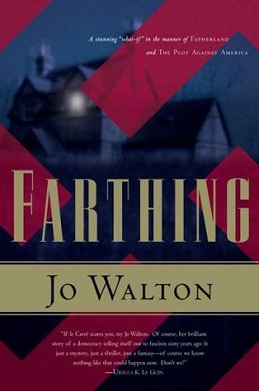
If you set out to read all the books that have been nominated for the Hugo or Nebula you can expect to come across a few truly great books, a couple really bad ones, a lot of mediocre ones, and one or two that, while good, just don't appeal to you. That's what I ran into with 'Farthing,' a perfectly fine novel that just didn't appeal to me very much.
I've never been a big fan of alternative history novels for several reasons. One is that the writer does a monstrous amount of research coming up with their fake timeline, research I as a reader just can't keep up with. So if a writer posits that such and such might have happened unless whatever, I just need to take their word for it. The second problem is that I can't shake the feeling that it's just not important what happens to these characters, or why I should care about them. I never seem to find it difficult to engage with characters in any other novel no matter how farfetched, but when it comes to alt. history I find myself questioning it the whole time and it really removes me from the story.
'Farthing' works great as a novel though, I found the characters interesting, it tells a good story, and as far as I could tell is a perfectly plausible possibility of how things could have turned out. It seems that Walton's turning point for this timeline was a peace negotiated by Hess between Britain and Germany (a possibility I knew nothing about and only learned through research once I'd finished the book). But, the novel barely held my interest and I found it difficult to get through.
She seems to set up the British aristocracy as the sort of villain that only exists in melodrama. Normanby, the main antagonist of the story, lacks only a tophat and handlebar mustache to be the perfect stereotype of the english villain. The character's homosexuality only serves to draw an extra line under the premise that everyone in the novel wears two faces. The only thing that keeps the character from becoming too offensive is that almost every other character in the novel turns out to be gay as well.
Perhaps what kept me back from engaging with the story is that I lack a solid understanding of the time period. I cannot tell when or if Walton is mocking the era or where the secondary departures from our timeline are. Was everyone in Britain at this time an ass? Was there that big of a divide between the aristocracy and the middle class, or is Walton trying to draw parralels between the society that actually was and how close it could have come to out and out fascism? That last one sounds literary enough, but without diving deep into early 20th century British aristocracy (something that holds almost no appeal) I'll never know.
I'm sure there is quite a bit in this novel that I didn't pick up on, and that can't be blamed on the author. There's nothing wrong with the book, many people enjoyed it. I can think of several people I would recommend it to, it's just not my cup of tea. And that's fine. People have to be willing to acknowledge that a book could be pretty good even if they don't like it. If I were handing out grades here I'd still give this book four stars, but I'm not the grading type.
This was my first introduction to Walton's writing, and even though I didn't enjoy this book very much I do look forward to reading more of her work.
No comments:
Post a Comment